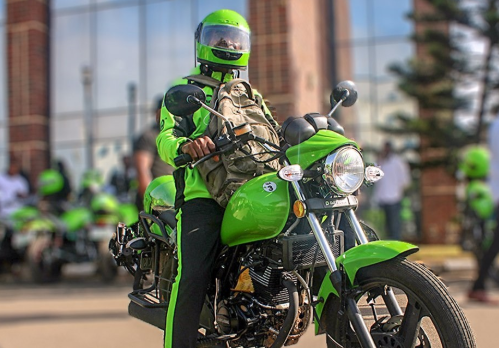The Lagos State government’s ban of ride-hailing business took another dimension today, as the operators of motorcycle, tricycle, and ride-hailing took to the streets in a protest against the directive of the Governor Babajide Sanwo-Olu’s administration.
Since the announcement, commuters of commercial motorcycles and tricycles have expressed panic and apprehension as they rely on these means of transportation to move within the state to avoid being stuck in traffic for several hours.
Riders Protest: Ahead of the February 1st enforcement date, Riders of the OPay and Gokada bike-hailing services staged a peaceful protest on Friday to protest the ban at the Lagos state House of Assembly.
The riders, who carried placards with inscriptions lamented that the ban would not only take their means of livelihood but also render them jobless. They have submitted a petition to the lawmakers who came out to address them afterward.
This protest cames after Nairametrics reported that the Gokada and Max NG platforms appealed to the government to reconsider the ban, terming it insensitive as they called for regulation stating that they were compliant with the 2012 traffic law. They had also spoken about the negative impact made by the ride services in terms of job creations and investments.
READ MORE: Lagos bans Gokada, ORide, others from 15 local governments
No going back – Lagos
It appears the state government is not moved as it made moves that depict it is not going back on the decision.
Instead of inviting the operators for a meeting, the government reacted to the questions and observations from commuters and operators via its Twitter handle.
When asked why Gokada, Max.NG and OPay were affected despite complying to the rules of the Lagos Traffic Law, the response was;
“They have also been found to be part of the problem. The truth is that Okada, no matter what fanciful name it is called, is not part of the Greater Lagos which we have embarked. Our youths no longer learn the trades we used to be proud of – tailoring, bricklaying, printing, painting, and others. Now we get artisans from neighbouring countries. Okada is not enduring trade.”
Another major question that has been on the mind of users is why alternatives were not worked upon before the ban. To this, the Lagos state government said that it was because of the crucial rate in which accidents were occurring due to the bikes, therefore there was a major need to stop the “bloody encounters” immediately.
On how the young people affected by this ban would cope in the labour market, the Lagos state government said its trust fund is readily available to help young people to start businesses.
It stated, “The government has programmes for the unemployed. The Lagos State Employment Trust Fund (LSETF), is very active, helping many to set up their businesses with cheap funds. The Ministry of Women Affairs and Poverty Alleviation has also been doing so much training young women in various and giving them some money to set up. Civic engagement has empowered many to start small scale businesses.”
Lastly, to the question of how the ban would decrease crime as opposed to its increase due to the fact that many people would be left jobless and move to crime as the alternative. The response was
“No, it won’t. Okada has been used by criminals to rob and terrorise innocent citizens. Police figures are scary. When it was banned in Kano and Edo, for instance, crime rates dropped. The law enforcement agencies are ready to fix anybody who wants to take to crime because he has lost his okada job,” it added.
